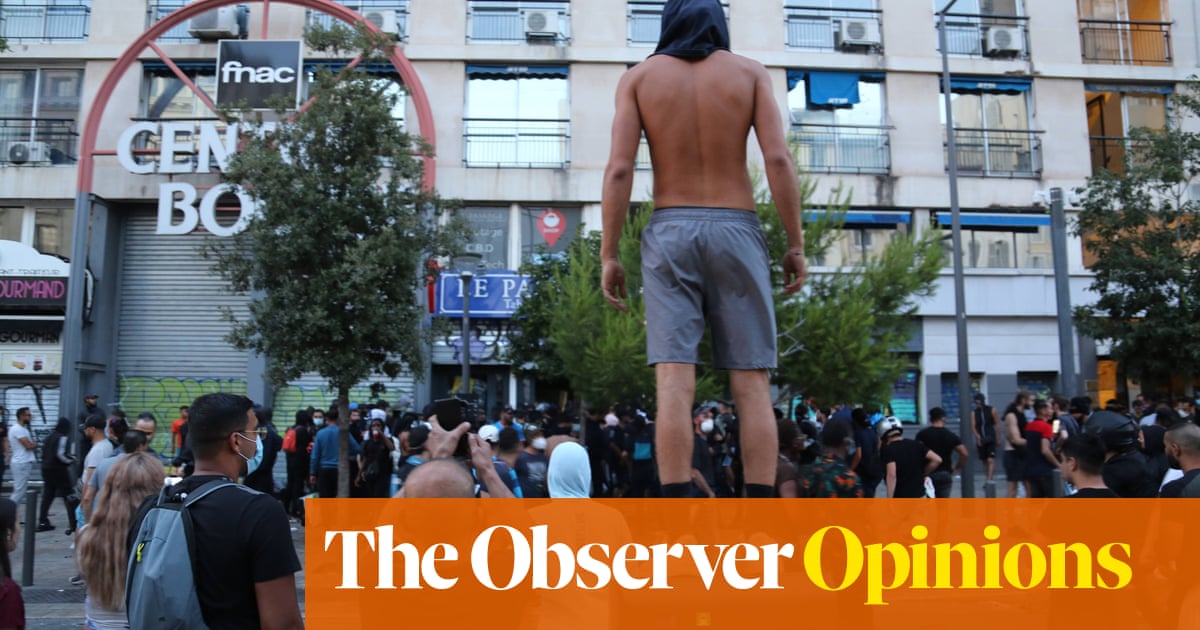
Should public policy be “race conscious” or “colour blind”? Should it target the specific inequalities faced by minority groups or treat all citizens equally without any reference to individuals’ racial and cultural backgrounds?
The contrast between these two approaches has often been seen as that between Anglo-Saxon multiculturalism and French assimilationism, the one “based on the right of ethnic minorities, of communities”, the other “based on individual rights”, as Marceau Long, then the president of France’s Haut Conseil à L’Intégration, put it in 1991, adding that the Anglo-Saxon approach, unlike that of the French, was that of “another way of imprisoning people within ghettos”.
Thirty years on, we can see the issues as more complex and less given to simple binary oppositions. Two recent high-profile events illustrate this complexity: the debates around the US supreme court’s decision to strike down affirmative action and those around the riots that ripped through France after the police killing of teenager Nahel Merzouk.
The supreme court’s verdict that Harvard’s race-based admission policy was illegal has led many to fear that the progress of African Americans in higher education will now stall. Yet, as the African American writer Bertrand Cooper observed even before the decision: “The reality is that for the Black poor, a world without affirmative action is just the world as it is – no different than before.”
Why? Because while affirmative action has improved prospects for middle-class black people, it has left untouched the lives of working-class African Americans. By 2020, the percentage of African Americans admitted to Harvard stood at almost 16% – higher than the proportion of black people within the US population. Black students in Harvard are, though, anything but representative of the African American community.
In most discussions about race, black Americans are regarded as constituting a singular community. However, black America has been, for most of the past half-century, the most unequal racial or ethnic group in the nation. White Americans in the top income quintile possess 21.3 times the wealth of white people in the lowest income quintile. For black people, that figure stands at a staggering 1,382. The poorest black people earn just 1.5% of the median black income.
This disparity shapes everything from education to incarceration. More than 70% of Harvard students come from the wealthiest 20% of families; 3% come from the poorest 20%. There were almost as many students from the wealthiest 1% as from the poorest 60%.
The greatest lack of diversity in America’s elite universities, in other words, is not racial but class-based. It is, though, one that deeply affects black Americans, because that same pattern of elite recruitment applies to African Americans as it does to the population as a whole. Affirmative action is action largely for the black elite.
This is not a new argument. In his seminal 1978 work, The Declining Significance of Race, the sociologist William Julius Wilson noted the changing contours of race and class and the development of a “deepening economic schism” within African American communities, “with the black poor falling further and further behind higher-income blacks”.
The title of Wilson’s book may seem ironic, given the centrality of race in public debate today. In material terms, Wilson’s thesis has proved largely accurate. Politically, though, there has been an increasing fixation with racial identities. This mismatch between material developments and political perceptions has ill-served the majority of African Americans.
It is not that racism does not continue to play an immense role in the lives of black people. It is rather that, as Cooper has observed: “Ignoring class divisions in Black America over the last 40 years has allowed the benefits of racial progress to be concentrated upon the Black middle and upper classes while the Black poor have largely been excluded.”
Many critics of race-conscious policies argue instead for the pursuit of “colour blind” policies that take no account of an individual’s race or culture. Perhaps the nation that most embodies such an approach is France. It is also the one that most reveals the problems with it.
French policy is rooted in its republican tradition and universalist principles, and a refusal to recognise racial distinctions in policymaking. The universalist belief that one should treat everyone as citizens, rather than as bearers of specific racial or cultural histories, is a valuable principle.
In practice, however, French policy has entailed being blind to racism in the name of being “colour blind”, and of using the demand for “assimilation” as a means of marking out certain groups – Jews in the past, Muslims and those of North African origin today – as not truly belonging to the nation. “Universalism” has become a weapon with which to point out the “difference” of particular peoples and to justify their marginalisation. France, as much as America, too often treats its citizens not as individuals but as members of racial or ethnic communities.
The French state not only refuses to recognise racial distinctions but also bans the collection of race-based data, making it far more difficult to evaluate the extent of racial discrimination, while providing a free pass to deny that such discrimination exists. A host of academic studies, attitudinal surveys and the use of categories, such as parent’s country of origin, that can act as surrogates for race and ethnicity, have exposed the degree to which France’s race-blind ideals are freighted with race-based assumptions, from racial profiling in policing to racial discrimination in employment.
And then there is the brutality of police violence, Nahel’s killing is but the latest example. Police perceptions of minority communities can be gauged by an extraordinary statement put out by two of France’s police unions during the riots, claiming that the police were “at war” with the “savage hordes” and warning that “tomorrow we will be in resistance” to the government.
In France, the refusal to recognise the social reality of racism in the name of “universalism” has helped create the very “ghettos” for which French politicians used to deride the Anglo-Saxon approach. In America, the preoccupation with policymaking by racial categories has neglected the very communities those policies are supposed to have benefited, by ignoring the many other features, such as class, that shape black lives, while also creating new social frictions – witness the tensions between African Americans and Asian Americans. What needs to be forged, beyond these two approaches, is a universalist perspective that embraces equal treatment but does not deny the reality of racial inequality.
Kenan Malik is an Observer columnist












